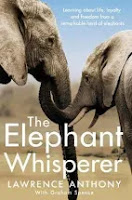Michael—Thursday
Anyone who cares about animals at all loves elephants. It’s
easy to understand why. They have interesting personalities, the females are
excellent mothers, protecting and caring for their calves, and they have
apparently complex communication including infra-sound rumples that are
transmitted through the ground. They also seem happy to interact with humans,
provided they are given space and respect. Many of these are documented in the
late Laurence Anthony’s book The Elephant
Whisperer (that I reviewed HERE). There are even some hints in the book
that suggest a relationship between Lawrence and his elephants (or between the
elephants and their Lawrence) that transcends normal communication.
Unfortunately, like most happy stories, there’s an intrinsic
tension, and I wrote about that HERE in Condoms
for elephants. Elephants require an enormous amount to eat—something like 350
lbs of vegetation every day. They have seven complete sets of teeth, and once
those are gone, they starve to death. It must be challenging to be always
hungry, and they usually rest during the heat of the day in order to use most
of the cooler night for feeding. They have essentially no natural enemies—other
than man—and tend to be successful if relatively slow breeders. Left to their
own devices, elephant populations grow slowly but surely, with the herds led by
their matriarchs wandering over vast areas in search of food. They sense rain and
head to those areas for the new growth.
The problem is what happens in drought conditions. The
elephants move through the bush devastating it, eating everything they can
find. That includes any tree bark that they can reach, and once the tree is
ringed, it dies as nutrients can’t reach the leaves. Worse, elephants will
break off large branches or push over trees altogether in order to reach a few
mouthfuls of leaves that they fancy. And they do this even if there is no
shortage of food. It’s a strange behaviour, because most animal species
(present company excluded) interact with their environments quite well, and
certainly don’t go about destroying their future food supply. There isn’t a convincing theory about why they behave this way—and apparently always have. Surely it’s
not a successful evolutionary trait.
Of course, now elephants are severely restricted in their
movement. In the seventies there was a horrendous die off of elephants in Kenya.
The conservation authorities there believed that given their large and
connected conservation areas, leaving the elephants unmanaged was the correct
and natural strategy. Unfortunately, drought conditions led to the loss of
thousands of elephants who died miserably of starvation and left behind devastation
that seriously affected other species such as the black rhino.
In more recent times the relentless demand for ivory,
drought, and the restriction of their range has led to a decrease in
elephant numbers by about two thirds over the last fifty years to below half a million world-wide. And
now politics has entered the fray.
Under Ian Khama, Botswana banned trophy hunting and the
transport of trophies overseas. His policy has always been that the best way of
exploiting Botswana’s superb wildlife resources is through high-end tourism
with a relatively small numbers of visitors who support a variety of jobs and
do little harm. The strategy has been a contributor to Botswana’s success. However,
Khama’s successor—President Masisi—sees things differently, and that’s probably
not independent of his feud with Khama. Their personal animosity led to Khama leaving the governing
party and supporting the opposition in the last election. Khama was accused of
elitism and lack of concern for small farmers in areas where crops were often
attacked by hungry elephants. He was also berated for the loss of hunting
revenue to the country. There were mutterings about corruption. Masisi reintroduced
trophy hunting, citing the overpopulation of elephants in the country.
It's become a huge issue in Botswana with the local people
on both sides. While it is true that elephants certainly aren’t currently
endangered in Botswana, it’s unfortunate that the issue is now being argued
against the background of personal animosity and party politics.
As for the longer term, elephant populations are decreasing
in most African countries and climate change will almost certainly devastate
some of their natural feeding ranges.
Enjoy them while you can.






Elephants are such wonderful animals. It's terrible to hunt them and steal their ivory tusks.
ReplyDeleteOn enemies, there are predators who hunt young elephants. In an elephant sanctuary in Sri Lanka, a relative saw a baby elephant with one ear. A tiger had torn off the other in an attack.
The females are terrific mothers, protective of their young no matter the situation.
They should be respected, not used to make money or hunt for trophies. This should be outlawed.
Kathy, You're quite right about predators. In the Okavango area there are prides of lions that specialise in hunting elephants. There was a remarkable, if rather gory, BBC documentary about it. However, in most of their range African Elephants really only have to fear man...
ReplyDelete